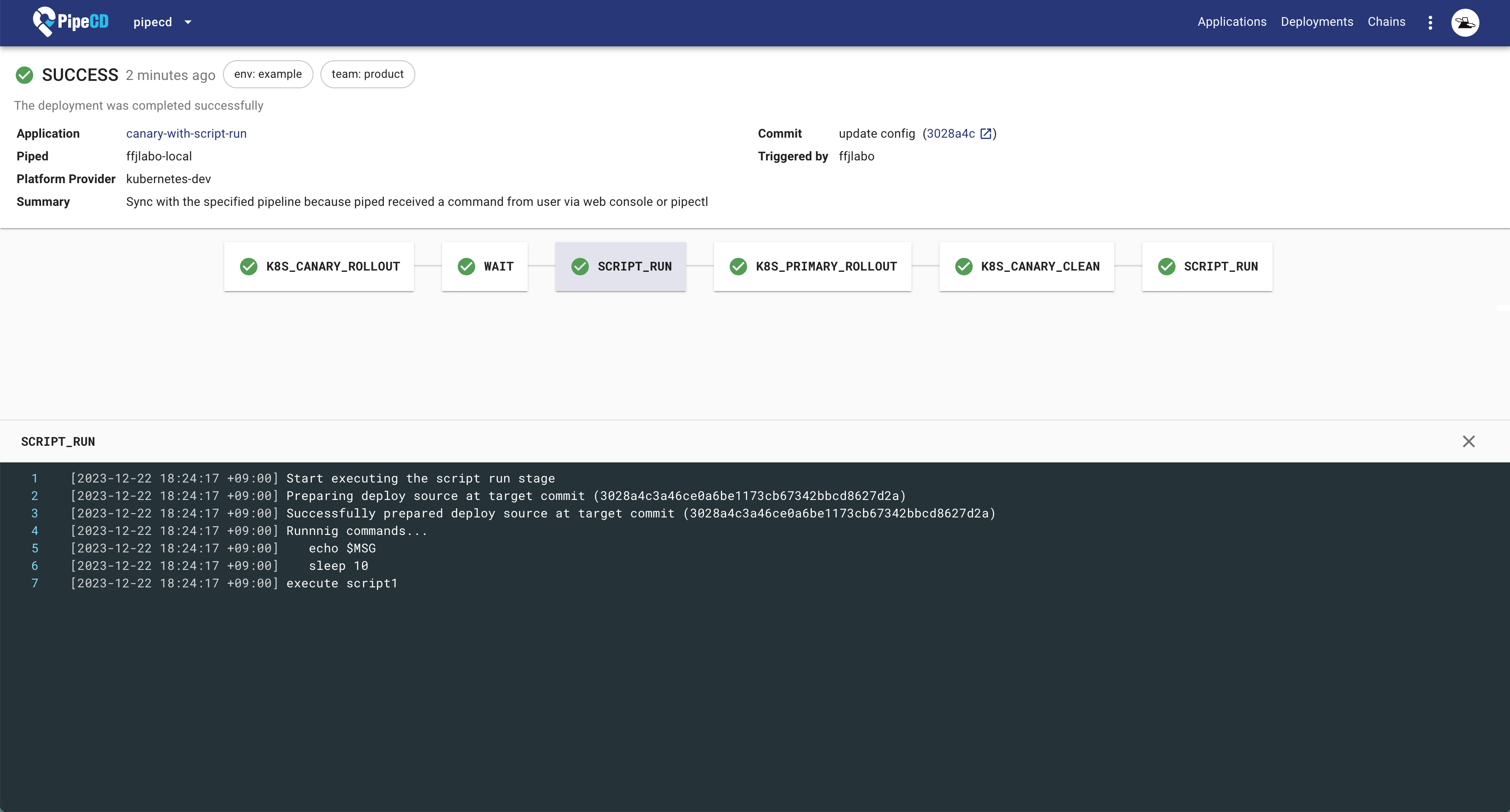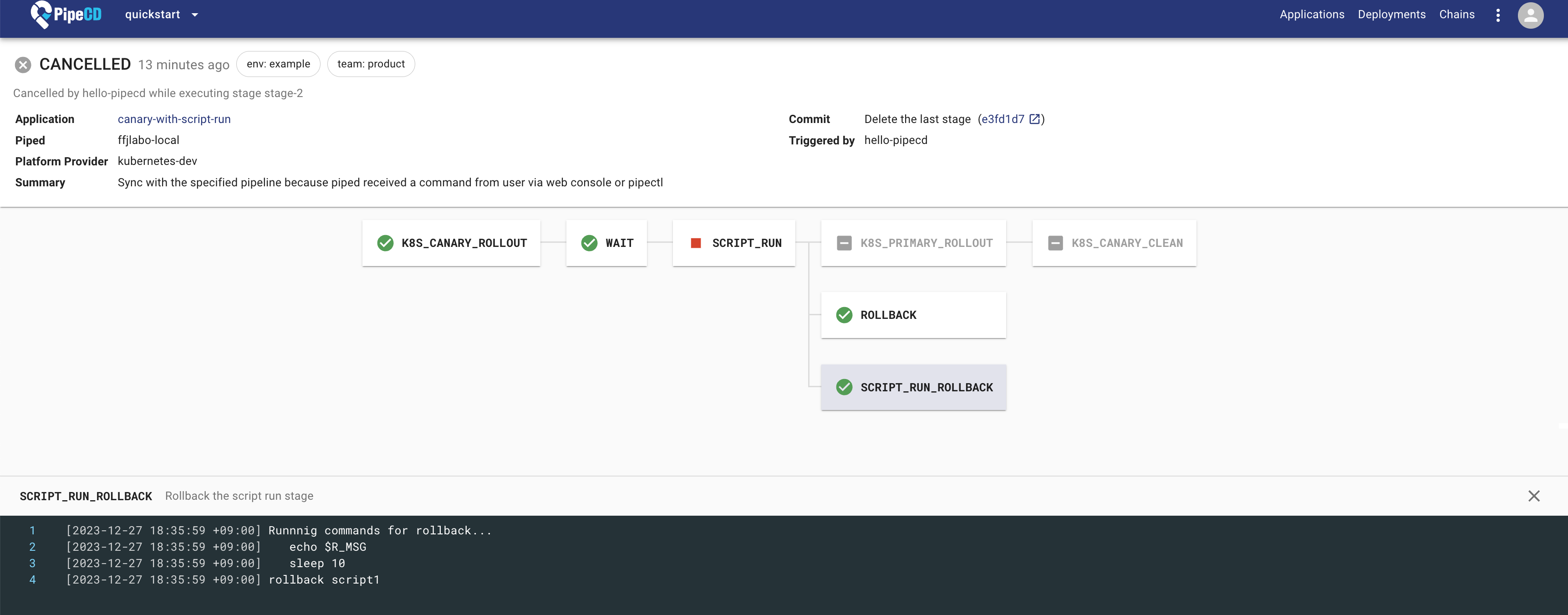Script Run stage
SCRIPT_RUN stage is one stage in the pipeline and you can execute any commands.
Note: This feature is at the alpha status and currently only for the application kind of KubernetesApp.
How to configure SCRIPT_RUN stage
Add a SCRIPT_RUN to your pipeline and write commands.
apiVersion: pipecd.dev/v1beta1
kind: KubernetesApp
spec:
name: canary-with-script-run
labels:
env: example
team: product
pipeline:
stages:
- name: K8S_CANARY_ROLLOUT
with:
replicas: 10%
- name: WAIT
with:
duration: 10s
- name: SCRIPT_RUN
with:
env:
MSG: "execute script1"
run: |
echo $MSG
sleep 10
- name: K8S_PRIMARY_ROLLOUT
- name: K8S_CANARY_CLEAN
- name: SCRIPT_RUN
with:
env:
MSG: "execute script2"
run: |
echo $MSG
sleep 10
You can define the command as run.
Also, if you want to some values as variables, you can define them as env.
The commands run in the directory where this application configuration file exists.

Execute the script file
If your script is so long, you can separate the script as a file. You can put the file with the app.pipecd.yaml in the same dir and then you can execute the script like this.
apiVersion: pipecd.dev/v1beta1
kind: KubernetesApp
spec:
name: script-run
pipeline:
stages:
- name: SCRIPT_RUN
with:
run: |
sh script.sh
.
├── app.pipecd.yaml
└── script.sh
Builtin commands
Currently, you can use the commands which are installed in the environment for the piped.
For example, If you are using the container platform and the offcial piped container image, you can use the command below.
- git
- ssh
- curl
- kubectl, helm, kustomize, terraform stored in $PIPED_TOOL_DIR
- Be careful. These tools are sometimes absent because they are installed when the first deployment has been done using each tool. Please check $PIPED_TOOL_DIR before you use them.
- Binaries can be specified as “kubectl-${version}” or “kubectl”.
- If no version is specified on the piped config or app.pipecd.yaml, both the ones with and without default version suffix will be installed.
- Please check the code about the default versions.
- and the builtin commands installed in the base image.
The public piped image available in PipeCD main repo (ref: Dockerfile) is based on alpine and only has a few UNIX commands available (ref: piped-base Dockerfile).
If you want to use your commands, you can realize it with either step below.
- Prepare your own environment container image then add piped binary to it.
- Build your own container image based on
ghcr.io/pipe-cd/pipedimage.
When to rollback
You can define the command as onRollback to execute when to rollback similar to run.
Execute the command to rollback SCRIPT_RUN to the point where the deployment was canceled or failed.
apiVersion: pipecd.dev/v1beta1
kind: KubernetesApp
spec:
name: canary-with-script-run
labels:
env: example
team: product
pipeline:
stages:
- name: K8S_CANARY_ROLLOUT
with:
replicas: 10%
- name: WAIT
with:
duration: 10s
- name: SCRIPT_RUN
with:
env:
MSG: "execute script1"
R_MSG: "rollback script1"
run: |
echo $MSG
sleep 10
onRollback: |
echo $R_MSG
sleep 10
- name: K8S_PRIMARY_ROLLOUT
- name: K8S_CANARY_CLEAN

The command defined as onRollback is executed as SCRIPT_RUN_ROLLBACK stage after each ROLLBACK stage.
When there are multiple SCRIPT_RUN stages, they are executed in the same order as SCRIPT_RUN on the pipeline. Also, only for the executed SCRIPT_RUNs are rollbacked.
For example, consider when deployment proceeds in the following order from 1 to 7.
1. K8S_CANARY_ROLLOUT
2. WAIT
3. SCRIPT_RUN
4. K8S_PRIMARY_ROLLOUT
5. SCRIPT_RUN
6. K8S_CANARY_CLEAN
7. SCRIPT_RUN
Then
- If 3 is canceled or fails while running, only SCRIPT_RUN of 3 will be rollbacked.
- If 4 is canceled or fails while running, only SCRIPT_RUN of 3 will be rollbacked.
- If 6 is canceled or fails while running, only SCRIPT_RUNs 3 and 5 will be rollbacked. The order of executing is 3 -> 5.
Feedback
Was this page helpful?
Glad to hear it! Please tell us how we can improve.
Sorry to hear that. Please tell us how we can improve.